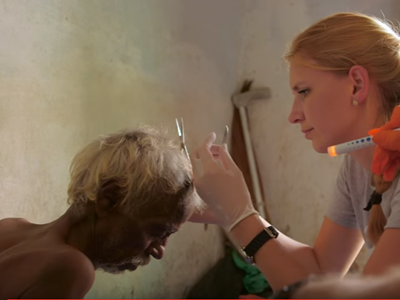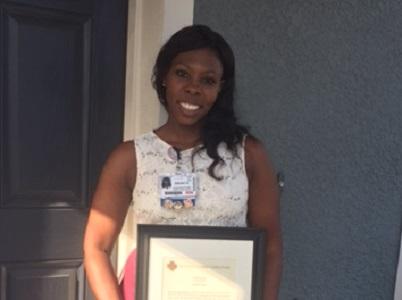Featured
Tags
Share
- Home / Blog / Faculty and Staff / Chamberlain Students Bring Service and Hope to the Philippines
Chamberlain Students Bring Service and Hope to the Philippines
Imagine your life without access to clean water, shelter and food. We often take simple necessities like these for granted because they are easily accessible here in the United States. But in some areas, including parts of the Philippines, lack of these provisions coupled with limited or no access to healthcare is the daily norm.
Germielynn (Gigi) S. Melendez, DNP, MSN, RN, a national associate professor of international studies at Chamberlain College of Nursing, recently spent two and a half weeks leading a Global Health Education Program service trip to Manila, Philippines, with 12 Chamberlain student nurses from campuses in the Chicago and Washington, D.C., metro areas. Throughout the journey, Dr. Melendez and the students provided healthcare services, food and necessities to the impoverished inhabitants of numerous locations:
- Philippine areas of Luzon, the largest and most populous island in the Philippines, located in the north
- Bohol, a smaller island in the Central Visayas region of the Philippines
- Tacloban City, the capital of Eastern Visayas, Philippines
The service trip commenced outside of Luzon in four Gawad Kalinga villages. Gawad Kalinga is a Philippine-based movement whose mission is to end poverty for 5 million families by 2024.[1] Melendez and the students visited local families in the villages, taught them about dental hygiene, breast cancer awareness and disease prevention, provided health assessments and interacted with children.
“The students raised nearly $2,700 through donations, which paid for rice, noodles, canned goods, and reading glasses,” explained Melendez. “Everyday items such as these are scarce among villagers. The Chamberlain students were moved by the expressions of gratitude they received from the locals for providing such basic supplies.”
A Grave Situation
One student visited residents of a squatter village located on cemetery grounds and witnessed just how truly alarming conditions can be. “A female resident explained to me that chemicals from the coffins would wash inside her home when it rained,” recounted Nicole Petrancosta, a student at Chamberlain’s Addison campus. “She told me that she and her husband took turns sleeping at night to ensure polluted water wouldn’t drain into their home. Gaining a better understanding of their realities was heartbreaking.”
During the second week of the service trip, the group traveled southeast to Talibon, a province on the north side of the island of Bohol. Over four days, Melendez and her students triaged 3,300 patients and assisted in 81 minor surgeries. Many of the patients had conditions and injuries that had not been assessed or treated in years.
Tedd Watts, a student at Chamberlain’s Atlanta campus, met a man who had stepped on a nail in 2010 and never sought treatment. “I could see the nail coming out the top of his foot,” explained Watts. “His foot was very swollen and I knew that he must be in extreme pain. His situation was eye opening. He was one of many patients we saw that would have already been hospitalized in the U.S. based, but did not have access to a healthcare provider.”
Village of Hope
On the fourth day in Talibon, the team visited the Village of Hope, an orphanage stationed on top of a mountain. Following a long, bumpy ride in an army truck, the students were welcomed by children who – despite their difficult lives – performed songs and dances.
After just three hours with the children, the students felt transformed. Petrancosta felt a surge of emotions after watching one little boy perform a song.
“He arrived at the orphanage when he was just seven weeks old, suffering from horrible medical conditions,” explained Petrancosta. “Despite his condition, a smile never left his face and you could tell he wanted nothing more than to give his best performance. Often, we are so quick to complain when little things in life do not go according to plan, but seeing this little boy live in the moment completely changed my perspective.”
Tacloban and the Power of Faith
The trip concluded in Tacloban City, northeast of Talibon. The region was recovering from two typhoons in one year. In cooperation with Rutgers University, Chamberlain students had the opportunity to speak with 12 families in the nearby villages of Basey in the Samar province of the Philippines.
Families shared the challenges they faced after the typhoons and how their lives were affected. Despite tragedy, many cited faith as the catalyst for helping them navigate their losses.
“Their dependency on religion and each other was the resounding theme in each story,” explained Watts. “They did not want handouts. They merely needed the means to restart their lives and ensure their children are well educated. I couldn’t help but ask myself if I would be so patient and understanding. Their faith was inspiring.”
After the family visits, Melendez and students were driven to the devastated areas of Tacloban and visited a cemetery’s memorial garden for those lost in the typhoon. Thousands of white wooden crosses lined the back of the cemetery. While most were blank, some were labeled with pencil or marker. One of their drivers lost his son and four cousins. The students helped him locate his son's cross.
“The most emotional part of the day was seeing the mass graves,” noted Kristina Stokes of Chamberlain’s Addison campus in northwest suburban Chicago. “Seeing families grouped together was heartbreaking. Every cross in the garden includes the date of the typhoon, November 8, 2013, and carries great emotion.”
Trip Strengthens Students’ Commitment to Care
After returning to the U.S. earlier this year, many students experienced feeling the physical effects of jet lag for several days. However, they agree that this pales in comparison to the hardships many Filipinos experience on a daily basis. The students are resoundingly thankful for the once-in–a-lifetime opportunity they had to provide care for those impoverished locals.
“Feelings of exhaustion will come and go,” explained Melendez. “But, these experiences left permanent marks on the minds and hearts of students, further reaffirming their decision to become nurses and transform the delivery of healthcare worldwide.”
The Global Health Education Program teaches the importance of global perspective. Students gain experience caring for patients from diverse cultures outside of the traditional healthcare setting. The unique, hands-on insight they gain will benefit their nursing careers and the increasingly diverse patients they will care for throughout their nursing careers.
[1] http://www.gk1world.com/faqs#WhatIsGK
By Natalie Sobolewski
More from Faculty and Staff
Request More Information
To receive the Chamberlain University Program Guide, including associated career paths, please select a program of study.







